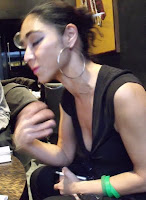 While not what I would call a vintage festival, the 53rd LFF ended on a high note for me, as I made it to the last filmmakers tea, a series of which had been held throughout the festival.
While not what I would call a vintage festival, the 53rd LFF ended on a high note for me, as I made it to the last filmmakers tea, a series of which had been held throughout the festival. An opportunity for press to meet one-to-one (or, as happened, in clusters) with filmmakers, they are a form of journalistic speed dating, one parking oneself awkwardly at a table with a keen or jaded filmmaker and hoping to come away five minutes later with some insights or at least good quotes.
Well, one of my dates stood me up, one was jetlagged and the other had such a full dance card, she conducted group interviews and then legged it to a screening. But, it was certainly an eye opener. Good scones, too, even if I was not as impressed by them as a colleague who piled her plate high and praised the quality of English food! One certainly doesn't hear that compliment paid often.
Anyway, I was very pleased to get an audience with Shirin Neshat, whose debut feature, Women Without Men, played at LFF. Given events in Iran over the summer, the film, which is set in 1953 as the elected Iranian government was replaced by that of the Shah, is timely and, in some quarters, controversial. Originally several installations, the film draws together the stories of four women, as the country is on the brink of the coup that brings the Shah to power. Despite their varying social positions, they all gravitate to a magical orchard, attempting to find a place for themselves in the face of oppression. An allegory for the state of Iran itself, Neshat's vision is confidently realised.
Wearing the green wrist bands of the opposition movement, Neshat confidently handled questions from six or seven journalists, explaining her position as both artist and activist. At some point, I will elaborate on her comments. But, it was an impressive appearance.
I also spoke to Ana Kokkinos, who had just flown in from Australia as a last-minute addition to the festival. Sadly, I was not able to catch her new film, Blessed, but I well remember her debut, Only the Brave, a tough-minded depiction of Greek-Australian teens. She admitted she was something of a teenaged tearaway and is drawn to these kinds of stories, and the new film returns to this terrain, as it follows teenagers and their parents throughout one eventful evening.
Of the films I saw in the second week, standouts are Precious and Ander, two depictions of home life in very different circumstances.
![Reblog this post [with Zemanta]](http://img.zemanta.com/reblog_e.png?x-id=1ce1d967-6db3-415c-b91b-a0a146de4b91)
No comments:
Post a Comment